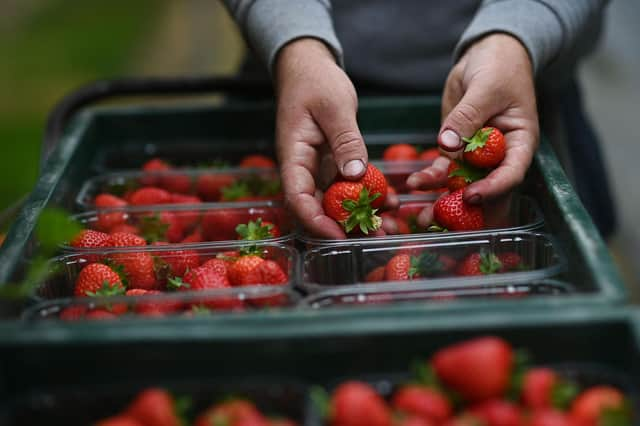Farming: We need migrant labour to maintain the food supply chain - Andrew Arbuckle


There was, you were told, in no uncertain terms, a promised land with none of the bureaucracy linked to being in the EU. Everything would be fine, and you were not to worry your little noddle.
So why is everything turning out very ‘unfine’ to coin an ugly word to fit a miserable situation.
Advertisement
Hide AdAdvertisement
Hide AdBasically no one worked out that the message on leaving the EU would remove a million essential workers from our fields, our processing factories, our lorry cabs and just about everywhere else.
These workers were largely invisible as they did the less glamorous, more physical jobs in our society. They were out of sight, working quietly away doing a range of work that was unattractive to the natives of this country.
No one saw that countries, such as Poland, which had provided hundreds of thousands of economic migrants, were now getting their own economies on track and there was no need to travel to the UK to earn cash.
And nobody saw that the anti-immigrant message was getting through to those who worked in the meat processing plants and toiled regardless of the weather in our fields harvesting our crops. The message propagated by politicians of the Farage variety was a blunt “We don’t want you here, pinching our jobs.” Sadly, the clamour of that view crowded out a gentler, considered, and reflective message of welcome to our shores.
Even a glance at history would have revealed the folly of turning our backs on the contribution made, and still makes, by migrant workers to the farming industry.
And that is why farming leaders are now tearing their hair out as they see their industry shrink and why captains in other industries are pleading for workers to be allowed back into this country.
True, some of the shortage of workers has been aggravated by the pandemic but that should not be used to excuse the ‘beggars’ muddle’ we are now in and for the UK government to try and hide behind the ravages of Covid.
We are in an economic mess and that is not only my opinion. It is the view I heard time and again last week by respected leaders of food, farming and tourist organisations. In a NFUS meeting all the representatives stated that the shortage of labour in the country was not fixable with a short-term plaster with visas lasting a few weeks.
Advertisement
Hide AdAdvertisement
Hide AdAll of them were critical of a government reluctant to take action to help solve the problem. While this weekend saw a slight relaxation in the government policy of keeping migrant labour on the other side of the Channel any numbers and timescales I have seen will not solve all of the problems.
Some areas where the problems created by the shortage of workers are more sortable than others. The supply of fuel to petrol stations can be fixed more easily than a break in the food chain
An easy example of this is soft fruit growers are already trying to guess how many pickers they will have and thereby how many plants they should put in their polytunnels for 2022. Get this sum wrong in one way and fruit will be left to rot; get it wrong by not planting enough and there is a loss of income.
Similar predictions of future production are required in the livestock world. Pig producers are currently forced to take animals out of the food chain because the processing factories are short of labour.
Under these circumstances, does the pig farmer reduce future piglet numbers by not allowing boars to do what boars like to do?
All of this underlines the importance of knowing further production constraints in some sectors until such time as the UK government gets its act together and avoids future chaos in what has previously been a well-regulated and reliable food chain.
The NFUS is encouraging fruit producers to provide information on the forward plans for the sector in 2022. If the growers can do that, the very least the government can do is give a timely reaction to the information to save everyone stress.
And in the process pay heed to the critical role and purpose of Scottish farming in the post-Brexit world.
Comments
Want to join the conversation? Please or to comment on this article.